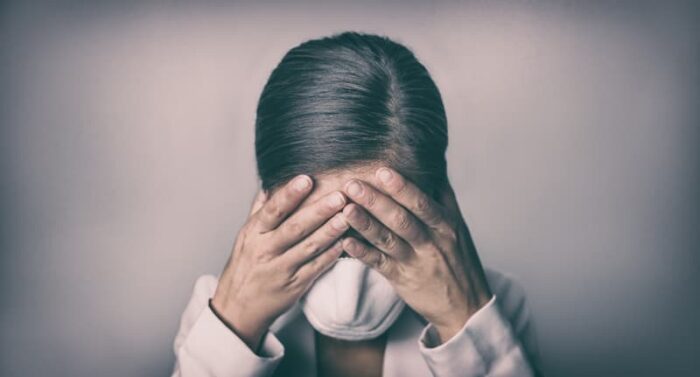- Calls to this hotline are currently being directed to Within Health, Fay or Eating Disorder Solutions
- Representatives are standing by 24/7 to help answer your questions
- All calls are confidential and HIPAA compliant
- There is no obligation or cost to call
- Eating Disorder Hope does not receive any commissions or fees dependent upon which provider you select
- Additional treatment providers are located on our directory or samhsa.gov
How Post-Pandemic Trauma Is Affecting Eating Disorder Recovery

Contributor: Staff at Sierra Tucson
The COVID-19 pandemic was a form of trauma for people around the world. With so much death, uncertainty and stress, a major spike in mental health condition symptoms, including those of eating disorders, occurred. Calls to the National Eating Disorders Association were up 70%-80% during the pandemic’s peak [1]. Although we’re entering a post-pandemic reality, the effects of trauma can still make it difficult to remain in eating disorder recovery.
Why Eating Disorder Symptoms Increased During the Pandemic
At the start of the pandemic, not much was known about COVID-19, leaving people scrambling to prepare for something they had never experienced before. A lockdown caused many to panic and stockpile food, isolate themselves from friends and family, and stay indoors where it was safe. Many faced sickness or the fear of becoming sick, the death of a family member or the loss of a job.
For many people, eating is a way to cope with stress and anxiety. The media caused fear of a food shortage, leading people to stockpile food. For those who struggle with binge-eating disorder, having so much food in the house can be triggering, especially during times of heightened stress.
At the same time, threats of the quarantine 15, a reference to weight gain during the pandemic made by the media, caused some to restrict calories out of fear of gaining weight. Without much known about how the virus could spread, some even became afraid of food.
Stephanie Parker, 34, described her struggles with eating disorder symptoms during the height of the pandemic. “The OCD and anxiety just made my eating disorder more intense, and for me that meant I would become obsessed with cleaning everything and then checking in with myself to see if I deserve to eat,” said Parker. “I would become scared of food — I got scared that food would make me sick because it wasn’t clean enough” [1].
Along with the fear of food and weight gain, most people began spending more time on social media, exposing themselves to altered, unrealistic body images, “thinspo” material that can encourage anorexia behaviors and other potentially damaging content. An increase in Zoom video calls and FaceTime led to many seeing their face on a screen more than ever before. This increased screen time could contribute to a negative body image and an obsession over appearance that can trigger eating disorder behavior.
Call Sierra Tucson for Help 855-921-0859
Why the Effects of Post-Pandemic Trauma May Not Go Away
Although the pandemic may be coming to an end, the anxiety and uncertainty it caused may still linger. After more than a year, many people became used to staying indoors, covering their faces with masks and facing isolation. With states in the process of completely opening back up, some people might be afraid to return to normal. For those who lost their jobs or a loved one to COVID-19, they may still be grappling with the aftermath and the emotional toll it caused. The pandemic was a collective trauma for us all, and long after a traumatic event has passed, mental health concerns can persist.
Posttraumatic stress disorder (PTSD) is a mental health condition that develops after a traumatic event. It can involve nightmares, flashbacks, intrusive memories of the event and avoidance of anything that may trigger thoughts of the trauma. While not everyone will develop PTSD after the pandemic, it’s expected that we’ll all have some lingering stress, anxiety and fear for many more months or even years to come.
During the pandemic, reports of general anxiety, depression and adjustment disorders in the U.S. rose between 80% and 90% [2]. All these conditions are risk factors for eating disorder symptoms. For those in eating disorder recovery, the added trauma of the pandemic and its lingering mental health effects can make managing symptoms more complicated.
How to Cope with Post-Pandemic Trauma When in Recovery
Coping with post-pandemic trauma while in eating disorder recovery can be challenging. It’s important to address the anxiety and stress you might be feeling to gain control of eating disorder behavior triggers.
Here are some tips for coping with post-pandemic stress:
- Practice relaxation techniques like yoga, meditation and deep breathing
- Eat a healthy, balanced diet
- Get moving every day with exercise like 20 minutes of walking
- Reach out to friends and family for support
- Seek professional help if you feel overwhelmed
If you are struggling with eating disorder recovery after the pandemic, you’re not alone. A mental health expert can help you gain control of your symptoms to begin healing again.
References:
[1] Noguchi, N. (2020, September 8). Eating disorders thrive in anxious times and pose a lethal threat. NPR. https://www.npr.org/sections/health-shots/2020/09/08/908994616/eating-disorders-thrive-in-anxious-times-and-pose-a-lethal-threat [2] D’Ambrosio, A. (2021, March 4). Eating disorders: Another consequence of COVID-19. MedPage Today. https://www.medpagetoday.com/special-reports/exclusives/91483About Our Sponsor:
 Located in Tucson, Arizona, Sierra Tucson is the nation’s leading residential and outpatient treatment center for substance use disorders, trauma-related conditions, chronic pain, mood and anxiety disorders, and co-occurring concerns. We provide integrated, holistic care for adults age 18 and older of all genders, including specialized programs for military members, first responders, and healthcare workers. Sierra Tucson was ranked No. 1 in Newsweek’s list of Best Addiction Treatment Centers in Arizona for 2020.
Located in Tucson, Arizona, Sierra Tucson is the nation’s leading residential and outpatient treatment center for substance use disorders, trauma-related conditions, chronic pain, mood and anxiety disorders, and co-occurring concerns. We provide integrated, holistic care for adults age 18 and older of all genders, including specialized programs for military members, first responders, and healthcare workers. Sierra Tucson was ranked No. 1 in Newsweek’s list of Best Addiction Treatment Centers in Arizona for 2020.
The opinions and views of our guest contributors are shared to provide a broad perspective on eating disorders. These are not necessarily the views of Eating Disorder Hope, but an effort to offer a discussion of various issues by different concerned individuals.
We at Eating Disorder Hope understand that eating disorders result from a combination of environmental and genetic factors. If you or a loved one are suffering from an eating disorder, please know that there is hope for you, and seek immediate professional help.
Published June 29, 2021, on EatingDisorderHope.com
Reviewed & Approved on June 29, 2021, by Jacquelyn Ekern MS, LPC

The EatingDisorderHope.com editorial team comprises experienced writers, editors, and medical reviewers specializing in eating disorders, treatment, and mental and behavioral health.


